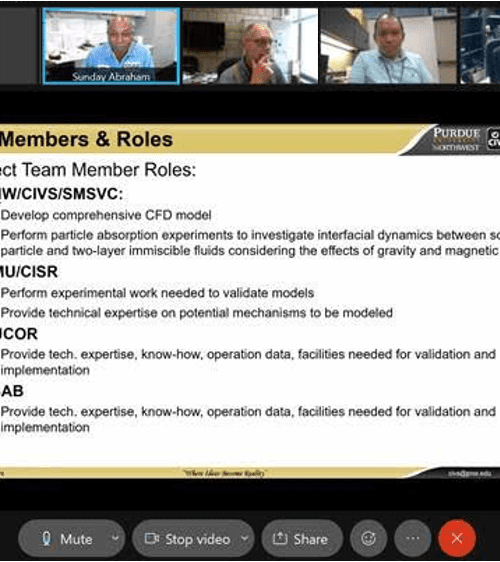CIVS Kicks Off NSF GOALI Project

CIVS hosted a virtual kick-off meeting on September 16, 2021 to officially start the National Science Foundation (NSF) Grant Opportunities for Academic Liaison with Industry (GOALI) Collaborative project: Understanding Formation and Removal Mechanisms of Micron-sized Non-metallic Inclusions in Steel Refining by Computational and Experimental Studies. The meeting was attended by the Lead PI, Dr. Chenn Zhou, CIVS Director; the Co-PI, Dr. Ran Zhou, from Purdue University Northwest (PNW), and the collaborators from Carnegie Mellon University (Co-PI), SSAB Enterprises, LLC (Co-PI), and NUCOR Corporation(Co-PI).
This project has received $223,819 NSF grant this summer and will last three years to investigate inclusion formation and removal mechanisms in a refining steel ladle. The project will leverage CIVS expertise in high-fidelity physics-based simulation and visualization, the experiment expertise of the microfluidics lab in PNW, and the Center for Iron Steelmaking Research (CISR) at CMU. The improvement of steel cleanliness through the best practice guideline developed in this project will increase product quality and productivity, directly enhancing U.S. steel industry competitiveness. The project will greatly strengthen existing active collaborations between academia and the steel industry.
NSF is an independent agency of the United States government that supports fundamental research and education in all the non-medical fields of science and engineering, which was established in 1950. Its stated mission is “To promote the progress of science, to advance the national health, prosperity, and welfare, and to secure the national defense.”
GOALI promotes university-industry partnerships by making project funds or fellowships/traineeships available to support an eclectic mix of industry-university linkages. Special interest is focused on affording the opportunity for: Faculty, postdoctoral fellows, and students to conduct research and gain experience in an industrial setting; Industrial scientists and engineers to bring industry’s perspective and integrative skills to academe; and Interdisciplinary university-industry teams to conduct research projects.